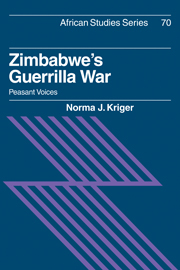Book contents
- Frontmatter
- Contents
- List of maps
- Acknowledgements
- Introduction
- 1 Peasant revolutions: theories and methods
- 2 Inequalities and peasant grievances
- 3 Strategies, goals and appeals: continuity and change
- 4 Guerrilla–civilian relations: the issue of popular support
- 5 Struggles in the struggle
- 6 Legacies of the war for peasants
- 7 Conclusion
- Appendix: Field research
- Notes
- Bibliography
- Index
- Other books in the series
3 - Strategies, goals and appeals: continuity and change
Published online by Cambridge University Press: 05 January 2012
- Frontmatter
- Contents
- List of maps
- Acknowledgements
- Introduction
- 1 Peasant revolutions: theories and methods
- 2 Inequalities and peasant grievances
- 3 Strategies, goals and appeals: continuity and change
- 4 Guerrilla–civilian relations: the issue of popular support
- 5 Struggles in the struggle
- 6 Legacies of the war for peasants
- 7 Conclusion
- Appendix: Field research
- Notes
- Bibliography
- Index
- Other books in the series
Summary
Mass African nationalist activity in Southern Rhodesia is conventionally dated from the founding of the Southern Rhodesian African National Congress (SRANC) in September 1957. Nationalist strategies changed between 1957 and the attainment of African majority rule in 1980. Periodizing the shifts in strategy is complicated because legal party activity inside the country overlapped with armed struggle from exiled bases, and armed struggle with constitutional negotiations. None the less, there is a consensus that between 1969 and 1972 ZANU adopted a Maoist strategy stressing guerrilla mobilization of peasants through revolutionary political education. Scholars have scrutinized leaders' utterances, often aimed at external audiences, to understand the movement's strategy and goals. This has led to a neglect of structural constraints affecting the guerrilla movement. An analysis of ZANU guerrilla appeals highlights the realities that confronted the fighters on the battlefield. Guerrilla appeals shared similar weaknesses with those of the legal nationalist parties. Coercive appeals against other Africans were prominent throughout the period of mass nationalism and utilitarian appeals were almost non-existent. These shared weaknesses in organizational appeals are linked to a growing state capacity, and especially repressive military capacity. Before illustrating the similarity between guerrilla and earlier nationalist parties' appeals, and the increasing state capacity, the nationalist parties' changing strategies and goals are discussed.
Nationalist strategies and goals
Organized political party activity inside Zimbabwe, 1957–79
The SRANC came into existence during the Federal period (1953–63) and was influenced by the trend towards greater African political participation in Northern Rhodesia and Nyasaland.
- Type
- Chapter
- Information
- Zimbabwe's Guerrilla WarPeasant Voices, pp. 82 - 115Publisher: Cambridge University PressPrint publication year: 1991



